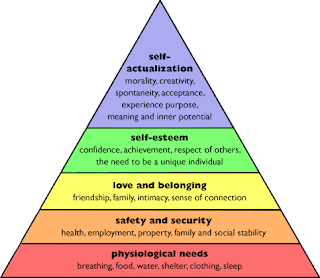I whole heartedly agree that what we do in school is important. We need to build relationships with our students. Children don't learn from people they don't like or trust (see the Rita Pierson video below).
Learning experiences need to be relevant. We build knowledge and understanding on existing knowledge and understanding, especially when we want to learn something. That's why students who never take any interest in reading books at school, pour over the road code or Facebook.
One size does not fit all. Nothing is black and white. Every behaviour situation comes with subtexts that we need to explore before we judge a student's actions. When Samantha punches Jessica in the nose, it might just be that she has reached the end of her patience after months of being teased by the latter. Or maybe her parents are fighting and the stress is more than she can deal with. Or she is worrying about a sick grandmother or frightened about moving to a new town.
 |
| Maslow's Hierarchy of Needs Image licensed for reuse - http://bit.ly/1IWK8HW |
I have read several posts and articles about meeting basic needs before. Stephanie Thompson makes great points in her post from February, "Social and Emotional Wellbeing Before Academic Success."
It's not the first time these sentiments have been expressed and it's not rocket science but it seems to be something we have to keep repeating: schools can't fix all the problems in society. That "It takes a village to raise a child," is an old adage, and regarded as a truism, but not given enough emphasis. We seem to have proven over the last century that economic drip down is not the cure to a community's ills.
I will never forget that I had to give in and exclude a child from my school when I was in the acting principal role. I had to put the needs of the other students and teachers first, and I'd run out of ideas and resources. Yet I pride myself on trying really hard to help each and every child. I know that if that child leaves our school, chances are there is not a lot else for him or her. Other principals are reluctant to take the student on. Families of these children are often dysfunctional or don't have the social, emotional or financial resources to assist their own child. Agencies are well meaning but under resourced and with too many cases. Often the links between agencies are weak.
Our students will not be "fixed" by creating Communities of Schools or making teachers better at moderating National Standards. We are already working our darnedest to create the most thoughtfully put together learning opportunities we can ( look at yesterday's post - Are We Teaching Our Kids the Right Way?).
It will take a concerted effort to change how we view our role as members of a community, from the Prime Minister in the Beehive, down to each of us in our neighbourhoods. We need to take responsibility for raising all of our children so that their basic needs - their basic rights as our children - are met.
No comments:
Post a Comment